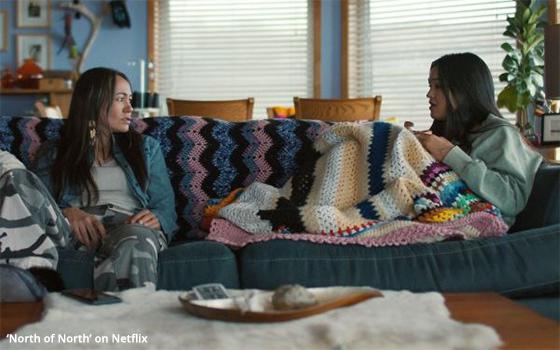Commentary
Insult Out Of Nowhere Mars Netflix Show
- by Adam Buckman , Featured Columnist, April 11, 2025

Here’s the situation: I’m watching this new Netflix series about a young indigenous woman living in a small town some distance south of the Arctic Circle in the north of Canada.
In the show, “North of North,” the town (a village really) is in the Canadian territory of Nunavut, where the young woman -- Siaja (Anne Lambe) -- yearns for a life characterized by something other than submitting to the wishes and commands of her inconsiderate, selfish husband.
In any case, he almost accidentally drowns her in frigid Arctic waters and takes no responsibility for the incident. So she leaves him to go stay with her mother, at least temporarily.
There, Siaja vents her anger and reveals her ambitions to her mother, who is a recovering addict. In this conversation, for no apparent reason, her mother decides to make a jarring remark about white people.
advertisement
advertisement
Here’s a bit of the conversation from the scene (pictured above): “I’m so sick of being a good housewife,” complains Siaja. “I went from taking care of you to taking care of him.”
“I’ve been sober for 10 years!” replies her mother, Neevee (Maika Harper).
“And I’ve barely lived. I need some air,” says Siaja, who then rises from the couch and stalks out of the room.
As she does this, her mother takes a parting shot: “You’re acting like a white girl with options!”
Upon hearing this, I just rolled my eyes and threw up my hands. I am so sick of this -- the occasional potshots at white people that are casually inserted into TV scripts.
I have no idea whether this phenomenon is rare or widespread for the simple reason that it is not humanly possible for me to watch every TV show in the TV universe.
The last time I wrote on this subject was in 2021. It was a TV Blog about two offhand remarks -- one disparaging white people uttered by Ice T in “Law & Order: Special Victims Unit” and the other offensive to Jews uttered by narrator Don Cheadle in the series premiere of the reboot of “The Wonder Years.”
The location of “North of North,” which premiered on Thursday, is remote. In Episode One, the only white person of any consequence was the town manager (kind of like a mayor) played by Mary Lynn Rajskub.
She is depicted as a high-strung jerk. When Siaja goes to her with a proposal that the overworked town manager hire her, the manager is dismissive, thoughtless, inconsiderate and rude.
No one complains about her whiteness, at least in Episode One, but it is not unreasonable to wonder whether her dismissiveness is supposed to represent the way “white people” treat the indigenous peoples of northern Canada.
As for “white girls” and their “options,” I didn’t see any white girls in the show at all. So, where does this fixation on white girls come from?
It comes from the minds of TV producers and scriptwriters, who think disparaging remarks about other groups based on race and ethnicity are OK.



